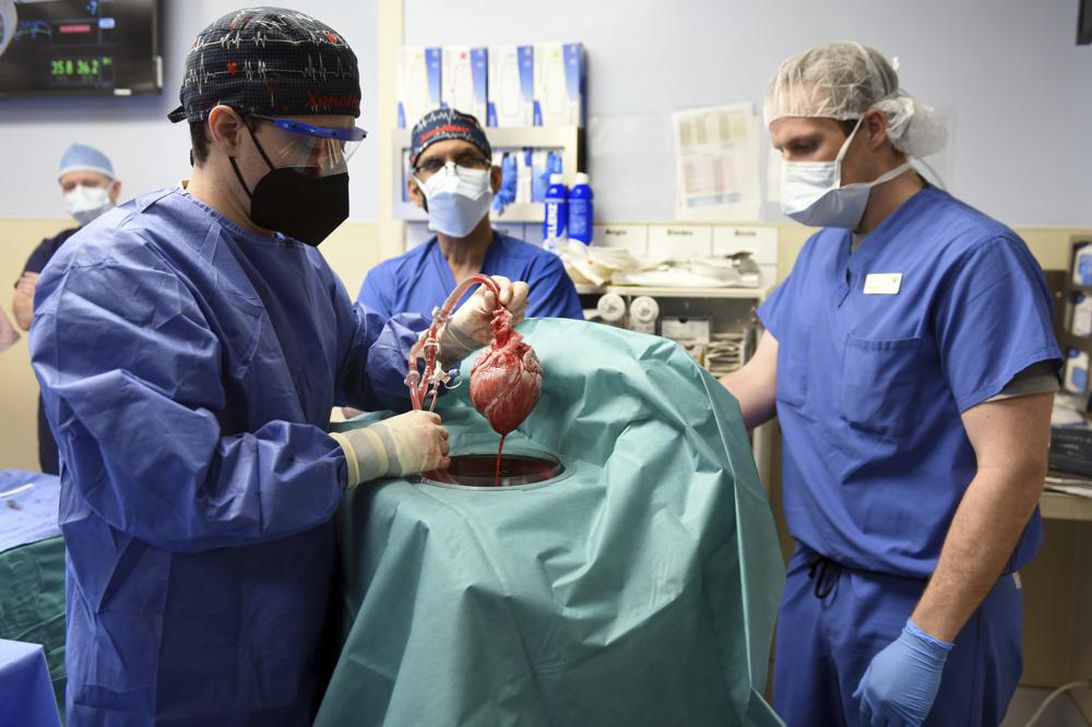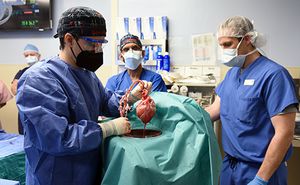
University of Maryland School of Medicine
“It was either die, or do this transplant. I want to live. I know it’s a shot in the dark, but it’s my last choice,” Bennett said a day before the surgery was conducted, according to a statement provided by the University of Maryland School of Medicine. Several leading transplant centers had previously deemed Bennett ineligible for a conventional heart transplant, including UMSOM, where the groundbreaking surgery was performed.
Members of the University of Maryland School of Medicine team show the pig’s heart prior to transplantation.
On Feb. 14, medical staff caring for Bennett even released an inspiring clip of him watching this year’s Super Bowl and singing “America the Beautiful” as Jhené Aiko performed her rendition at the game. While the team continues to monitor Bennett closely, particularly due to reported preoperative kidney setbacks that persisted after the procedure, Griffith offered encouraging words: “Beyond that, I’d say all thumbs are up.”
“His heart function looks great, his blood pressure looks very good, and in fact, he’s on medicine to reduce his blood pressure. That’s how good it is right now,” Bartley P. Griffith, the University of Maryland School of Medicine physician who surgically transplanted the heart, said in an update on Feb 11.
To conduct the life-saving operation as a last resort, doctors genetically modified a pig’s heart to increase the chances of Bennett’s body accepting it as its own circulatory control center. Without such modifications, nonhuman-to-human organ transplants carry risks like triggering severe, and sometimes fatal, immune responses.
“We’ve been asked how we would define success,” Griffith said in the team’s most recent update, underlining his cautious hope. “I think we’ve surpassed, in many measures, what we expected.”
Last month, an ambitious crew of doctors transplanted a genetically modified pig’s heart into a human patient for the first time, marking a historic moment for medicine. About five weeks post-surgery, the 57-year-old organ recipient, David Bennett, was still doing well.
“This is the culmination of years of highly complicated research to hone this technique in animals, with survival times that have reached beyond nine months,” Muhammad M. Mohiuddin, a professor of surgery at the University of Maryland School of Medicine who established the cardiac xenotransplantation program with Griffith, said in a statement. “The FDA used our data and data on the experimental pig to authorize the transplant in an end-stage heart disease patient who had no other treatment options.”
This medical milestone undoubtedly lays the groundwork for a new generation of animal-to-human organ transplants, known as xenotransplantation, and directly addresses the organ shortage crisis. “There are simply not enough donor human hearts available to meet the long list of potential recipients,” Griffith, who’s also a professor in transplant surgery at the university, said in a statement.
“We are also optimistic that this first-in-the-world surgery will provide an important new option for patients in the future,” Griffith said. According to organdonor.gov, well over 100,000 Americans are awaiting an organ transplant, and more than 17 patients die each day while still on the waitlist.
“I look forward to getting out of bed after I recover,” Bennett said.
Leading up to his surgery, Bennett was one of those anxious patients on hold. He was hospitalized and bedridden due to terminal heart disease.






